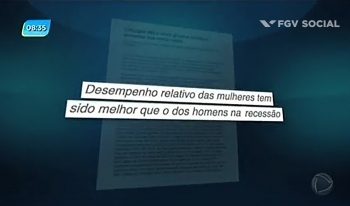Between the last quarters of 2015 and 2016, the economic downturn had different impacts on Brazilians, based on their household conditions and genders. That is one of the conclusions drawn from a survey conducted by FGV Social - Center for Social Policy based on microdata of the Continuous Brazilian Household Sample Survey (PNADC), from the Brazilian Institute of Geography and Statistics (IBRE).
On average, the people in charge of their households – formerly known as “head of household” – lost 6.06% of their real income (typically the highest in the household), as well as 2.12% presence in the job market. In turn, those designated as spouses gained 3.67% presence in the market and single-handedly managed to increase their own real income by 9.06% during the same recession period, unlike all other social groups (including age range or education, region, or geographical area). Sons and daughters also increased market participation (up 1.46%), but failed to reach the same results in terms of compensation, sustaining real average income losses amounting to 5.99%, particularly due to higher unemployment rates.
A gender-based analysis shows that women have outperformed men when it comes to real income changes during the economic crisis. Despite holding a higher average income, men could not keep up with the results reached by women in the past two years. Even with double-digit inflation rates in 2015, women still managed to increase their real income from work by 0.7%, while men saw a 1.9% drop. And although both groups showed negative results in 2016, men sustained a higher income drop of 5.1%, compared to 2.8% among women. An isolated year-over-year analysis of the last quarter of 2016 reveals the latest trends and shows that men’s income dropped 2.7% and women’s income dropped 0.77%, suggesting a slower downturn among both groups throughout the year.
“Across all different periods, women are the ones who have made a difference at work during the crisis,” said Marcelo Neri, director of FGV Social - Center for Social Policy.
Go to the website to watch the video, in Portuguese, of the complete analysis.





